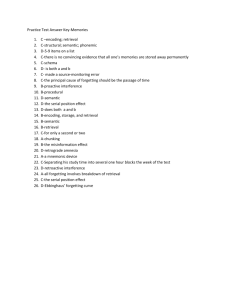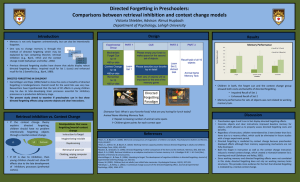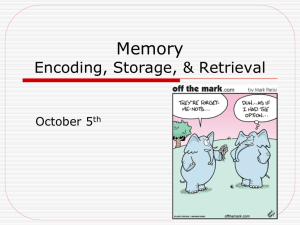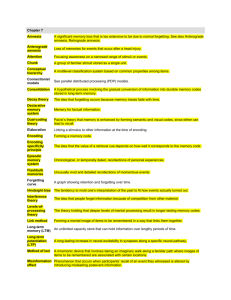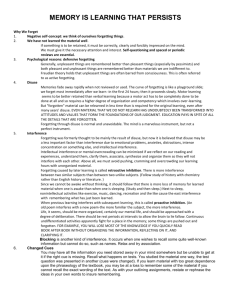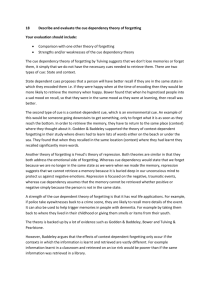Ought We to Forget What We Cannot Forget? A
advertisement
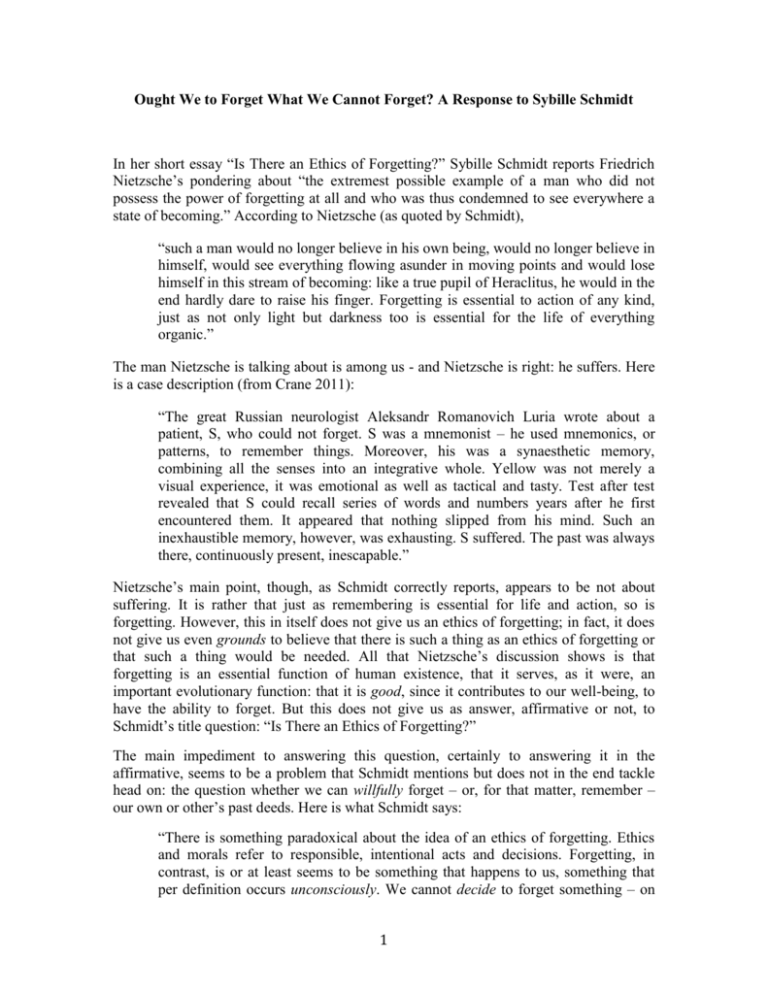
Ought We to Forget What We Cannot Forget? A Response to Sybille Schmidt In her short essay “Is There an Ethics of Forgetting?” Sybille Schmidt reports Friedrich Nietzsche’s pondering about “the extremest possible example of a man who did not possess the power of forgetting at all and who was thus condemned to see everywhere a state of becoming.” According to Nietzsche (as quoted by Schmidt), “such a man would no longer believe in his own being, would no longer believe in himself, would see everything flowing asunder in moving points and would lose himself in this stream of becoming: like a true pupil of Heraclitus, he would in the end hardly dare to raise his finger. Forgetting is essential to action of any kind, just as not only light but darkness too is essential for the life of everything organic.” The man Nietzsche is talking about is among us - and Nietzsche is right: he suffers. Here is a case description (from Crane 2011): “The great Russian neurologist Aleksandr Romanovich Luria wrote about a patient, S, who could not forget. S was a mnemonist – he used mnemonics, or patterns, to remember things. Moreover, his was a synaesthetic memory, combining all the senses into an integrative whole. Yellow was not merely a visual experience, it was emotional as well as tactical and tasty. Test after test revealed that S could recall series of words and numbers years after he first encountered them. It appeared that nothing slipped from his mind. Such an inexhaustible memory, however, was exhausting. S suffered. The past was always there, continuously present, inescapable.” Nietzsche’s main point, though, as Schmidt correctly reports, appears to be not about suffering. It is rather that just as remembering is essential for life and action, so is forgetting. However, this in itself does not give us an ethics of forgetting; in fact, it does not give us even grounds to believe that there is such a thing as an ethics of forgetting or that such a thing would be needed. All that Nietzsche’s discussion shows is that forgetting is an essential function of human existence, that it serves, as it were, an important evolutionary function: that it is good, since it contributes to our well-being, to have the ability to forget. But this does not give us as answer, affirmative or not, to Schmidt’s title question: “Is There an Ethics of Forgetting?” The main impediment to answering this question, certainly to answering it in the affirmative, seems to be a problem that Schmidt mentions but does not in the end tackle head on: the question whether we can willfully forget – or, for that matter, remember – our own or other’s past deeds. Here is what Schmidt says: “There is something paradoxical about the idea of an ethics of forgetting. Ethics and morals refer to responsible, intentional acts and decisions. Forgetting, in contrast, is or at least seems to be something that happens to us, something that per definition occurs unconsciously. We cannot decide to forget something – on 1 the contrary: Our will to forget something will ensure that we keep remembering it. The aporia of an “ars oblivionalis” (Eco 1988) turns into a practical dilemma when transposed into an ethical context: How can we be made responsible for what we forget?” The general problem Schmidt is referring to here stems from what is commonly known as the “ought implies can” principle. The principle states that necessarily, a person is morally obligated to φ only if the person can φ. Now, in order to have an ethics of forgetting, we have to be allowed to use a deontic vocabulary, that is, we have to be warranted in using concepts like “right”, “wrong”, “obligatory”, and “permitted” as pertaining to acts of forgetting. However, to do so, so the principle claims, we have to possess an ability to intentionally control the mental activity that is involved in forgetting (or remembering) something. Yet, we seem to have no intentional control over what we forget (or what we remember). The case mentioned above offers illustration because it continues as follows: “He [the patient referred to above as “S”] could only “forget” something if he “placed it” in a inconspicuous spot in the lists or mental journeys he used to remember things. Thus his forgettings were not so much defects in memory as they were defects in perception. To forget required in S an act of will, a purposeful hiding away in the recesses of his mind. This was his only way to relieve himself of the burden of his past – and his present, too, as everything surrounding him continuously stimulated him.” However, as it is made clear in the cited passage, S’s maneuverings are not instances of forgetting proper. What he does is not to remove awareness of the past – which I take forgetting to consist in – but instead to hide away (parts of) the past from his attention, from his inner gaze, as it were. This is not the same as an inability to remember, i.e., to recall these past deeds: these mental items are still there for S to find, they are still available to his consciousness, it is just that they are hidden away so much that he cannot (easily?) find them. They are not available to his immediate awareness, so to speak. Why is the “ought implies can” principle so appealing? The answer, it seems to me, lies in the very nature of the deontic: that it is essentially action-guiding. When we speak about what is right, wrong, permitted, or obligatory, we imply a necessary connection to action. This is not so with the evaluative: when we claim something to be good, we do not necessarily imply that it has to be pursued by someone. But, it seems, this is all we have when it comes to forgetting. Forgetting is good, but is it obligatory or even permitted? Ought we to forget what we cannot forget? One can attempt to answer this problem in several ways and in ending my response I would like to mention some of these, together with the questions they raise. Schmidt herself alludes to forgiving, and in particular, Hanna Arendt’s analysis of it, as taking us nearer to an ethics of forgetting. However, while forgetting and forgiving might indeed have the same function (that of helping us to leave the past behind and move on), the two are importantly different. Forgiving is “a conscious, deliberate decision to release feelings of resentment or vengeance toward a person or group who has harmed you, 2 regardless of whether they actually deserve your forgiveness.” (‘What is Forgiveness?’ Greater Good Science Center, University of California, Berkeley) Forgiving therefore, as Schmidt admits, is not the same as forgetting, nor does it imply forgetting. In fact, it is hard to see any obvious connection between the two (despite the slogan “To forgive is to forget”), hence it is hard to see how an ethics of forgiveness would give us or even take us nearer to an ethics of forgetting. The second way to respond to the problem is to distinguish between individual and social (communal) forgetting. It seems that the latter is under our control: we, as a community, can decide not to forget something and put this decision into action (e.g., set up archives to store the relevant memories), so it is also possible to forget something and put this decision into action (e.g., destroy the archives storing the relevant memories). But it is obvious that this is not what the ethics of forgetting is about. This kind of social forgetting assumes that the individual memories exist and that nothing can be done about them on the individual level, i.e., that no willful forgetting proper is possible. However, I take it, this is just the issue that an ethics of forgetting would need to deal with. The third possible response is to attack the “ought implies can” principle. One way to do this is to point to examples when we do seem to hold people responsible for involuntarily forgetting something. For example, we blame those who forget an important birthday or anniversary, and we penalize those who forget to file a timely tax return. However, these are instances when we ought not to forget something and it is hard to find cases that invite the same response when we ought to forget something, although we cannot (I am hesitant about this claim, though, since I don’t know how much I can trust my intuitions at this point). Furthermore, the cases cited can be brought within the scope of the “ought implies can” principle. For what are actually faulting people for in these cases are an intentional failure at an earlier point of time - e.g., not putting the relevant dates in their calendars. This is why they are considered to be cases of negligence when it comes to the court of law, and not of cases irresponsible forgetfulness proper. Given the problems of the previous three responses, we should try a fourth route: to deny that we cannot willfully forget something. I am skeptical that such control over our memory can be attributed to us without any external help (although this too is an empirical question, open to scientific investigation). However, it does seem that already now, though in a primitive state only, we possess medications that can, if not erase, but certainly dampen the strength of a memory (Kolber 2006) The drug propranolol, in particular, has the proven effect of reducing both the emotional intensity of a memory, and as a result, also its factual richness. If this is so, and especially given that the prospect of memory erasure proper is within sight (or so Kolber ib. reports), the use of drugs like propranolol does raise ethical questions that give rise to an ethics of forgetting, while staying within the scope of the “ought implies can” principle. 3 References Crane, J. K. (2011) ‘The Ethics of Forgetting’, Emory Center for Ethics website, http://emoryethics.blogspot.de/2011/09/ethics-of-forgetting.html, Accessed at 19/12/2013 Kolber, A. J. (2006) ‘Therapeutic Forgetting: The Legal and Ethical Implications of Memory Dampening’, Vanderbilt Law Review, 59: 1561-1626 Schmidt, S. ‘Is There an Ethics of Forgetting?’, in this volume. ‘What Is Forgiveness?’, Greater Good Science Center website, http://greatergood.berkeley.edu/topic/forgiveness/definition, Accessed at 19/12/2013 4
